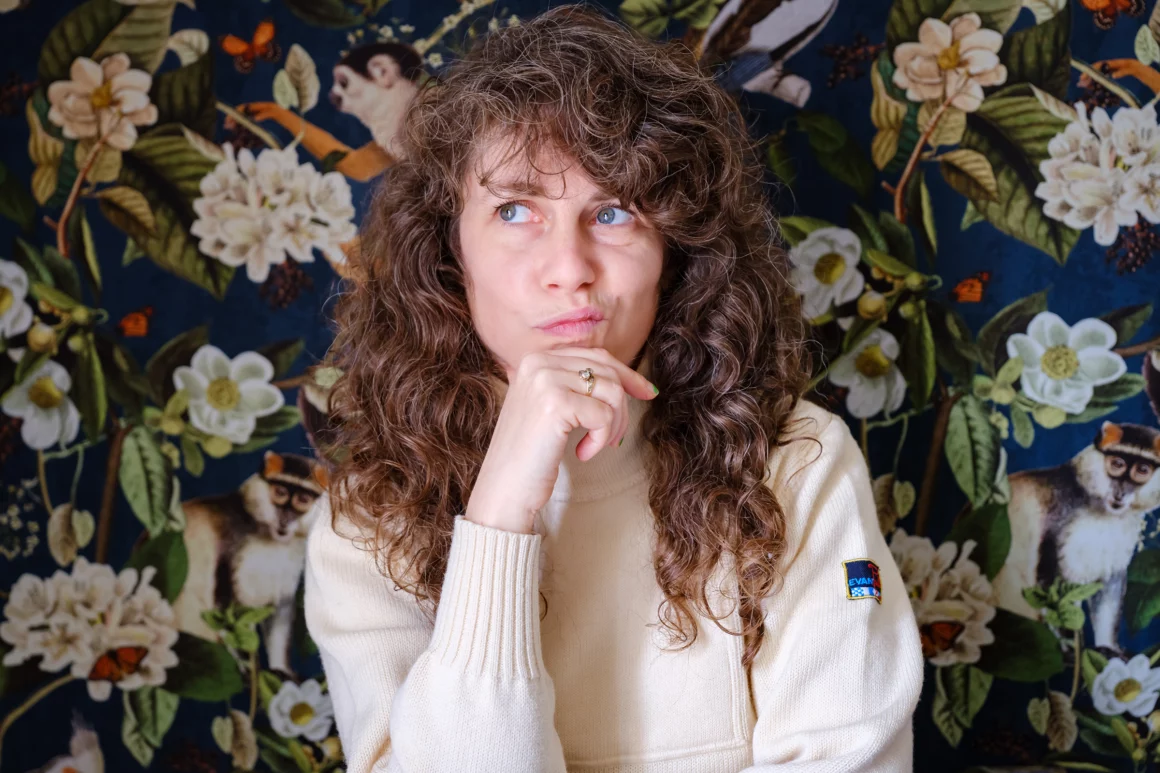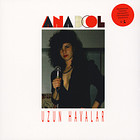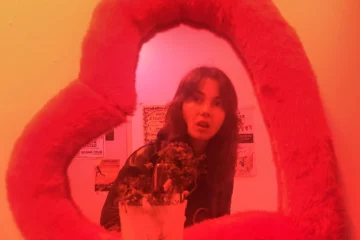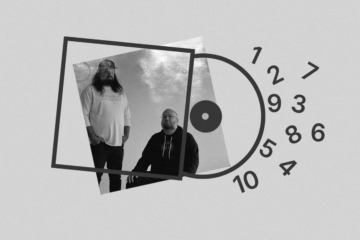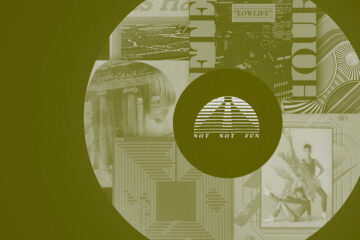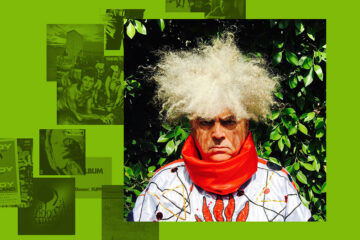About four years ago, only those in the know were familiar with the sonic worlds of Gözen Atila aka Anadol from Istanbul, who at the time was still living in Berlin. A cassette was floating around on Instagram. Nothing else. A short while later, »Uzun Havalar« was released on vinyl which marked the breakthrough for Anadol. In an instant, the local music fans were clamouring for the somewhat weird songs full of presets, organ sounds and the obligatory portion of nonsense. The record, which found a home on the Hamburg label Pingipung, ended up on the turntables of every second bar DJ in Germany. Sometimes several times in one evening.
By then, Anadolu Rock had been talked about, discussed and played as a genre for some time. Sometimes imported from Turkey, but far more often re-released in Germany and England, Neşe Karaböcek and Erkin Koray were hot tips – especially when greats like Baris K targeted the edits at the dance floor. A revival several decades after they were active. Both people with a family history of migration from Turkey (and Kurdistan) and people without listened to Derdiyoklar’s songs. Some are said to have found an awareness of their continuing discrimination and marginalisation through their music. But their music way also played with relish: Sultry, post-migrant, intercultural party nights were celebrated, cries of »Hal, Hal« permeated the neighbourhoods. But the hangover eventually followed: It sometime annoyed the Turks that every Alman was now celebrating the ›exotic‹ sultriness of Anadolu Rock every Friday night, but the morning after, when they went to look for a flat, they were still turned down because they had the wrong last name.
It sometime annoyed the Turks that every Alman was now celebrating the ›exotic‹ sultriness of Anadolu Rock every Friday night, but the morning after, when they went to look for a flat, they were still turned down because they had the wrong last name.
…
And those whose only real interest was to attract fame or Discogs money were soon pursuing other trends: West Africa, Iran, South Africa and Colombia – new, old records could be ›harvested‹ there just as well. Anadol thrust herself right into the midst of the depressive atmosphere and dissolved it immediately: Instead of dwelling on the (sometimes painful) past, she used old equipment but new ideas. She crafted a weightless sound that sailed through music history and across national borders. There were French chansons and Italian soundtracks; Spanish and Latin American rhythms; synth and organ sounds; flexible, elastic jazz and, hidden somewhere in between, the odd ›Middle Eastern‹ melody, or what you might recognise as such. Instead of an album, there was a radio play, which fanned out anew each time, revealing its sources, but remaining clearly new in its singularity. She took music very seriously, but never too seriously.
Last year’s follow-up, Felicita, was even more romantic, more introverted, but by no means less restrained. Au contraire: the album revealed an undreamt-of depth, revealing new facets even on the fifth listen. But Anadol doesn’t usually talk about any of this – she doesn’t really give interviews.
We’re meeting on Zoom for a good reason today: Your second LP »Hatıralar« from 2017 will be re-released. Would you like to start by telling the story of this album… and why it was released on a USB stick?
Anadol: No one wanted to release »Hatıralar« at the time. Except for this friend of mine, Işık Sarıhan, who showed an interest in releasing the material on his label Inverted Spectrum Records. Which we then went ahead with and did. I’d previously thought about releasing it myself. But there’s one thing you need to know: the material was already five years old at the time. So I’d already been talking to vinyl pressing plants, but it’s really difficult and stressful for an artist to release records on their own.
And how did the USB stick come about?
I didn’t just want to put out a digital version of it online. It had to be a physical release: We then packed the USB stick into mini bags, along with two bonus tracks from my first album and the video for »Tahta Sucuk« in high resolution. We also printed postcards as covers with handwritten messages to all the buyers on Bandcamp. The album ended up with a Berlin label maker who also went on to release my album »Uzun Havalar« as a cassette on his Kinship label. In turn, the cassette found its way to Andrea Wienck from Pingipung.
Which is also where the repressing of »Hatıralar« is being released.
I told Andrea that the album could be re-released. However, I was really keen to have the LP remixed. The original mix was very amateurish.
You have already mentioned that »Hatıralar« was originally written between 2011 and 2012, just like your first, but unfortunately pretty much unknown album »Çürüyen Yıllar«. Back then you were studying »music technology« in Istanbul. So I asked myself: Was there a particular reason why you started making music that doesn’t sound ›technological‹ in the strictest sense?
The truth is that I went to university to become a »serious« composer of electronic music. I experimented with recording and processing techniques. But to be honest, it didn’t go so well. At least not until the last year of my studies. I played around with mini organs, wrote songs, produced music videos at night and then put them online. Anadol also came into being during this time.
But you also produced radio plays, right?
I even finished my degree with a dissertation on radio art and with my own piece for radio called »Amateurs and Sailors«. Then, after the first few years, a career as a producer of radio plays was my intended choice. The Austrian broadcaster Ö1 aired several of my pieces and also commissioned some. Only later did I realise that the field is very narrow and underrated by the industry.
My work with radio as a medium can be clearly recognised on »Uzun Havalar«. With its montages and collages, the whole record feels like a radio play.
Eventually, I started combining the recordings from the radio play with those from the Anadol project. »Ay Cürüdü« is the first song that came into being in this way. »Uzun Havalar« came about in the same way: This song didn’t fit in anywhere else.
You mainly use old instruments and technology from the seventies. Your rhythm sections in particular are just presets that come with the machines. Such as rumba or cha-cha-cha…
Yes, I use all of them. Except for the tango preset. I hate it.
»It’s complicated: Traditional songs are a tricky business. I hope I don’t have to talk about Middle Eastern or Turkish music traditions anymore.«
Anadol
Restrictions come with the machines. You then overdubbed these melodies with live musicians. What was the idea behind that?
Technically speaking, I didn’t work with overdubs, but with recordings that I made with musician friends and then edited at home with the original songs. The musicians didn’t play over the songs, but instead I asked them if they can improvise in E major.
Now I know this sounds like is a typical journalist’s question, but it really seems to me that you’re an artist who doesn’t want to play by the rules. Instead of giving live performances, you DJ. And instead of giving interviews, you are very protective of your privacy. Why?
I’m not DJing this year. There are so many artists performing who play their songs a billion times. Then there’s the travelling on top. I don’t like these aspects of being a musician. I don’t have the stamina to perform on stage and I suffer from stage fright.
There is this quote from you: »No matter if the music is traditional or contemporary, we have to be authentic«. Is authenticity really important to you?
I’m not a big fan of this quote to be honest. On the occasion of the release of »Felicita«, Andi (Otto, co-owner of Pingipung; author’s note) interviewed me for the press release. We talked about my relationship with traditional music, I think. By naming my previous record »Uzun Havalar« after a Turkish musical tradition, I meant it as a pun. »Uzun Havalar« means ›long songs‹ and I simply played long songs. But a lot of people wrote afterwards that I had improvised traditional songs. I have no idea where that came from. It’s complicated: Traditional songs are a tricky business. I hope I don’t have to talk about the musical traditions of the Middle East or Turkey any more. It doesn’t make any sense to me. Sure, I use middle-eastern melodies myself sometimes, but who doesn’t.
And it’s true the other way round as well. You borrow from both French chanson and Spanish folklore…
Exactly. I’ll use anything that pleases me. I generally like music where it’s hard to decide what you have in front of you. This is central to Anadol. That’s the reason why I used »authentic« in the quote.
I won’t stay [in Istanbul], no matter what happens! On the other hand: I don’t particularly like Germany either.
Anadol
Speaking of which: Does your stage name Anadol also play a part in people misunderstanding your music as a commentary on traditional music? The wave of Turkish re-issues that swept across Europe a decade ago introduced a relatively large number of diggers and nerds to the term ›Anadolu‹.
That’s another story. A few years ago, I used to DJ in bars in Istanbul with a friend of mine. And yes, that was at the time when Anadolu Rock was enjoying a revival: with Selda Bağcan and Barış Manço re-releases and Finders Keepers records. The friend used these records, edited them and added beats. And I said, »Why don’t you just call it ›Anadol‹? It’s a really good name.« But he didn’t take it, so I did instead. The thing is: There is this whole mythical transfiguration of the name because Anadol was the name of a Turkish make of car – the first car manufactured in Turkey. I’m still happy with the stage name, even though it was more of a joke than anything serious.
With all the hype about Turkish music, I’m just wondering: A clever booking agent for a venue puts together different, disparate Turkish artists to create a Turkish evening – have you ever been faced with booking requests like this?
Yes, I’ve been a DJ at events like these. But then I stopped taking gigs like that because they really didn’t make any sense to me. They were always so… (she shudders) I got the feeling that there was only one reason why I was booked for these shows: The organisers checked which of the musicians were Turkish.
I don’t know whether you want to talk about politics as well. You’ve just moved back to Istanbul and there was a presidential election recently – from here it feels counterintuitive to be in Istanbul right now.
I’m constantly moving between Berlin and Istanbul. And there is no >currently< – all this has been happening here for 20 years. So as not to give the wrong impression, I don’t know where I will be living in the autumn. I will not stay here, no matter what happens. On the other hand, I don’t particularly like Germany either. So I’ll have to see…
Have I forgotten to ask something? I think we’ve spoken a lot about the release and your career.
There will be another release. Last summer I met Marie Klock from France at a festival in England. I was backstage during her performance and I really liked what I heard. Then we exchanged messages for a while and later she came to Istanbul where we recorded a bizarre pop record. She sings and recites lyrics and also plays the keyboard very, very beautifully. The record is slated for release soon on Pingipung.

